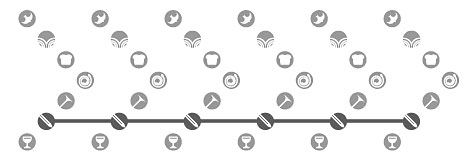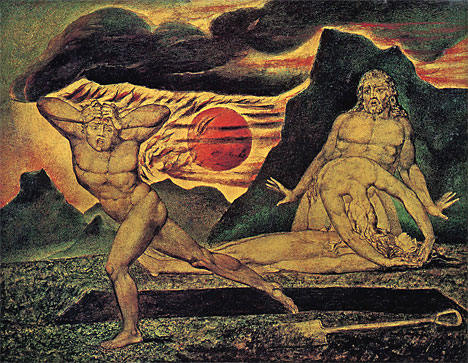Mothers and Brothers
“What is the meaning of ”one is taken and the other left’? This is commonly thought to refer to the rapture — one taken up into heaven, and the other left on earth to kick himself for not praying the sinner’s prayer when he had a chance. On the bright side, there will be a lot of free, unmanned cars available” (Heaven Misplaced, p. 104).
Matthew 24 is a prediction of the Covenant curses falling upon Judah for the last time. One being taken and the other left has to do with displacement. Titus enslaved the best Jews and took them in ships to Egypt.
“And the Lord will take you back to Egypt in ships, by the way of which I said to you, ‘You shall never see it again.’ And there you shall be offered for sale to your enemies as male and female slaves, but no one will buy you.” (Deuteronomy 28:68)
It’s one thing to get the historical fulfilment correct, but there’s a whole lot more going on here. In His speech, as the fulfilment of Israel, Jesus is working through the Bible Matrix, a combination of the Creation week, the weekly and annual Feasts, and the process of Dominion. This means that He is using examples of all the previous historical Covenant structures to make His point. The Covenant cycle has snowballed through history and picked up a lot of events on its way.
At this point, He’s using Atonement symbols (Covenant Sanctions). So (if you have a copy of Bible Matrix) you can see how He’s linking many previous Sanctions events together to describe the oncoming storm. [1] Visually, it looks like this:
 Atonement concerns the distribution of the Covenant blessing and the Covenant curse. It is a two-edged sword, vengeance and redemption, two goats. Jesus’ words looked forward, but they also looked backwards in time. Based on that, what can we see beyond the (now) historical fulfilment?
Atonement concerns the distribution of the Covenant blessing and the Covenant curse. It is a two-edged sword, vengeance and redemption, two goats. Jesus’ words looked forward, but they also looked backwards in time. Based on that, what can we see beyond the (now) historical fulfilment?
Who were the first two men working in the field? One slew the other, but only the slain one was left behind. The other was exiled as the second goat. The blood of Abel would finally be avenged — and on that generation.
Then we have two women grinding at the mill. This is often a euphemism for sex (as is the threshingfloor – Pentecost. At the first Pentecost, Israel committed Covenant harlotry.). The question is, who is the true Bride? Lamech failed to decide. Jesus, like Solomon, wasn’t going to fail to pick the true mother.
We have a choosing of the true Adam (working the Land) and a choosing of the true Eve (the childbearer), head and body, the two approaches of the High Priest on the Day of Coverings. God was coming to judged the Temple, and, as in Eden, there was nowhere to hide.
It’s architectural, too. Adam is outside the house, Eve is inside. All these types are wrapped up in Jacob and Esau. Esau took two wives (“daughters of men”) and he worked outside. Jacob, who did not despise the Covenant, was inside the tent: Esau the bloody bronze altar and Jacob the fragrant golden altar, who had to wear goat skin to smell like… the field.
Matthew 24 is about the end of Herodian, that is, Idumean (Edomite), worship. It was the end of Cain, the end of Lamech, and the end of Esau. Jesus would return as the True Husband to single out the true mother and the true brothers.
Structure and architecture aren’t everything. But for Moses, the prophets, Jesus, the apostles, and their audiences, they were the first thing to be aware of not only when composing a text but when hearing a text. Sadly, often it’s the last thing we look at, so we have trouble figuring out what room we’re in and whether something is a bed or a table.
It’s the reason many speeches are so long. The prophet is building a house. Here, Jesus is tearing it down.
_____________________________________
[1] Another example discussed elsewhere on here is Jesus’ reference to vultures gathering. It is an ironic take on the Feast of Booths (aka Ingathering). Because Israel would not put food on the table for the nations, she would be the food on the table. The Gentiles would be unclean scavengers instead of footwashed guests.)



























March 16th, 2012 at 1:02 pm
I had heard once that that verse did not fit the rapture because it was saying in essence: taken away to judgement.
I love the two men in the field connection, wow!